KESENJANGAN IMPLEMENTASI DALAM PENATAUSAHAAN BARANG MILIK NEGARA YANG BERASAL DARI KONTRAKTOR KONTRAK KERJASAMA
DOI:
https://doi.org/10.32477/jrm.v2i1.95Keywords:
Implementation Gaps, Administration, State assets which originating from Contractor of Cooperation ContractAbstract
Oil and gas industry began in the Dutch colonial era. Based on Article 78 Government Regulation No. 35 Year 2004 on Upstream Oil and Gas, that all goods and equipment which directly used in the Upstream Oil and Gas Activity that purchased by Contractor becomes to State assets which is developed by the government and managed by SKK Migas. Enactment of Government Regulation No. 6 of 2006 about the management of State assets / Regional assets (BMN / BMD) as the implementation of the mandate of Law Number 17 Year 2003 on State Finance and Law No. 1 of 2004 on State Treasury is a new chapter for the management of state assets more orderly , accountable, and transparent. SKK Migas as an institution whose function is to supervise the implementation of the Production Sharing Contract (PSC) has purpose to provide maximum benefit for the country. On the other hand, state asset management by the Government aims to achieve accountability through the orderly administration and better management of State assets. The difference between that purpose, can lead to implementation gaps. This research was conducted with the aim of knowing the activity of administration of State assets originating from Contractor of Cooperation Contract which has the highest implementation gaps, find the source of the cause and finding the impact on the administration of State assets originating from Contractor of Cooperation Contract. Measurements implementation gaps using tools that called integrity scorecard. Integrity scores obtained by submitting some questionnaires to the respondents. The respondents in this study is the contractors which have commercial production. The research results illustrate the reporting activity has the highest implementation gap. It can also be seen from the BPK findings on Internal Control System in State assets administration originating from Contractor of Cooperation Contract on LKPP Year 2007 - 2013. Based on the descriptive analysis of the State assets which originating from Contractor of Cooperation Contract enforcement background and administration activity analysis, it can be concluded that the cause of the implementation gap is the political pressures, bureaucratic overlap, and resource constraints in the implementation of the regulation.Based on the inductive analysis of the weakness symptoms that occur in the administration of State assets originating from Contractor of Cooperation Contract, can be concluded that the data presented in the central goverment financial report (LKPP) potentially not comply with the qualitative characteristics standards such us relevant, reliable, comparable and understandable.
References
BPMIGAS (2009), Pedoman Tata Kerja Pengelolaan Rantai Suplai Kontraktor Kontrak Kerja Sama Nomor 007-REVISI-1/ PTK/IX/2009, Buku Ketiga.
Centre for International Private Enterprise and Global Integrity (2012), Improving Public Governance, Closing the Implementation Gap Between Law and Practice.
DiMaggio, P.J., dan Powell, W.W. (1983), The Iron Cage Revisited: Institutional Isomorphism and Collective Rationality in Organizational Fields, American Sociological Review, 48,147-160.
Jamaan (2008), “Pengaruh Mekanisme Corporate Governance dan Kualitas Kantor Akuntan Publ ik terhadap Integri tas Informasi Laporan Keuangan” Tesis Universitas Diponegoro, Semarang.
Milles, M.B. and Huberman, M.A (1984), Qualitative Data Analysis. London: Sage Publication.
Peraturan Pemerintah Nomor 35 Tahun 2004 tentang Kegiatan Usaha Hulu Minyak dan Gas Bumi (Lembaran Negara RI Tahun 2004 Nomor 123, Tambahan Lembaran Negara RI Nomor 4435) sebagaimana telah dua kali diubah terakhi r dengan Peraturan Pemerintah Nomor 55 Tahun 2009 (Lembaran Negara RI Tahun 2009 Nomor 128, Tambahan Lembaran Negara RI Nomor 5047).
Peraturan Pemerintah Nomor 6 Tahun 2006 tentang Pengelolaan Barang Milik Negara/ Daerah (Lembaran Negara RI Tahun 2006 Nomor 20, Tambahan Lembaran Negara RI Nomor 4609) sebagaimana telah diubah dengan Peraturan Pemerintah Nomor 38 Tahun 2008 (Lembaran Negara RI Tahun 2008 Nomor 78, Tambahan Lembaran Negara RI Nomor 4855).
Pearturan Pemerintah 27 Tahun 2014 tentang Pengelolaan BMN/D.
Peraturan Menteri Keuangan Nomor 135/ PMK.06/2009 tentang Pengelolaan Barang Milik Negara Yang Berasal Dari Kontraktor Kontrak Kerja Sama (Berita Negara RI Tahun 2009 Nomor 270) sebagaimana telah diubah dengan Peraturan Menteri Keuangan Nomor 165/PMK.06/2010 (Berita Negara RI Tahun 2010 Nomor 442);
Peraturan Pemerintah Nomor 79 Tahun 2010 tentang Biaya Operasi yang Dapat Dikembalikan dan Perlakuan Pajak Penghasilan di Bidang Usaha Hulu Minyak dan Gas Bumi (Lembaran Negara RI Tahun 2010 Nomor 139)
Peraturan Menteri Keuangan Nomor 02/PMK.05/ 2011 (Berita Negara RI Tahun 2011 Nomor 2)sebagaimana telah cabut dengan Peraturan Menteri Keuangan Nomor 245/ PMK.05/2012tentang Pedoman Akuntansi dan Pelaporan Aset Berupa Barang Milik Negara Yang Berasal Dari Kontraktor Kontrak Kerja Sama.
Peraturan Menteri Keuangan Nomor 248/ PMK.05/2012 tentang Sistem Akuntansi Transaksi Khusus
Peraturan Direktur Jendral Kekayaan Negara Nomor 1 Tahun 2013 tentang Petunjuk Teknis Penyusutan BMN yang Berasal Dari KKKS.
SKK Migas, Annual Report 2012.
Suharto, Edi (2008), Kebijakan Sosial Sebagai Kebijakan Publik, Bandung: Alfabeta.
Sukmono, Koko (2005), Evaluasi Manajemen Penatausahaan Barang Milik/Kekayaan Negara Pada Kementerian Koperasi dan Usaha Kecil dan Menengah.
Smith.B.Kevin & Larimer.W. Christopher (2009), “How Does It Work? Policy Implementation.” The Public Policy Theory Primer”, Philadelphia, PA: Westview Press, pp.155- 156.
Undang-Undang Nomor 22 Tahun 2001 tentang Minyak dan Gas Bumi (Lembaran Negara RI Tahun 2001 Nomor 136, Tambahan Lembaran Negara RI Nomor 4152);Undang- Undang Nomor 1 Tahun 2004 tentang Perbendaharaan Negara.
Undang-Undang Nomor 17 Tahun 2003 tentang Keuangan Negara (Lembaran Negara RI Tahun 2003 Nomor 47, Tambahan Lembaran Negara RI Nomor 4286).
Undang-Undang Nomor 1 Tahun 2004 tentang Perbendaharaan Negara (Lembaran Negara RI Tahun 2004 Nomor 5, Tambahan Lembaran Negara RI Nomor 4355). http://www.globalintegrity.org/report









